A deal to end the political standoff in Honduras has been thrown into doubt after a negotiator for the de facto government suggested that Manuel Zelaya, the ousted president, will not be returned to power.
The comments by Arturo Corrales prompted confusion on Saturday as it had been thought Zelaya and Roberto Micheletti, Honduras's de facto leader, had reached a deal.
The two sides have been at odds for four months over whether Zelaya should be reinstated before presidential elections due to be held in November.
It was thought that through the deal Zelaya could be returned to power before elections on November 29, if the measure won support from congress and the supreme court.a
But Corrales said that since congress would not be in session before the elections, Zelaya would not be confirmed in office.
"The congress is not in session, and I understand that it is programmed to return after the elections, because each one of the representatives is, at this very moment, in their respective districts campaigning around the clock," he said.
Andres Conteris, a reporter for the US-based public television and radio show Democracy Now, who has been holed up with Zelaya in the Brazilian embassy in the Honduran capital, said the remarks by Corrales went against the agreement.
"This is absolutely a contravention of both the spirit and the word of the accord that was signed today," he told Al Jazeera by phone from the embassy in Tegucigalpa.
"For the negotiator of the coup regime to say that the legislature is not going to meet until after the election is a contravention because the accord specifically states that no later than November 5, the new constitutional authority of the unified government will be empowered as the new government of Honduras."
Great interview from Adrienne Pine on Honduras -(It goes black for a few seconds in the beginning but the video comes back)
Honduras: Briefing with COFADEH leader Bertha Oliva, 11/5 @ 11 AM, Cannon 201
Briefing with Bertha Oliva, General Coordinator of COFADEH,
Committee of Relatives of Missing Prisoners in Honduras
Thursday, November 5, 2009
11 AM
Cannon 201
Bertha Oliva is the General Coordinator of the Committee of Relatives of Missing Prisoners in Honduras (COFADEH). Bertha's husband, professor Thomas Nativí was "disappeared" in 1981, during the period when the death squads were active under Honduras' military dictatorship. She founded COFADEH together with other women who lost their loved ones, in order to keep alive the memory of the hundreds of dissidents that were "disappeared" between 1979 and 1989 and seek justice and compensation for their families. Among other achievements, her organization succeeded in obtaining a condemnation of Honduras by the Inter American Court for Human Rights, the first such ruling against a state in the institution's history.
Bertha has since become an emblematic figure in the Central American human rights movement. In addition to the issue of the disappearances, her organization represents victims of severe rights violations, educates the general public on human rights issues, and investigates and helps prepare legal documentation for cases. COFADEH has been keeping careful track of the massive rights violations that have taken place under the coup regime that took power in Honduras on June 28, 2009 and has just finished a detailed report on the current human rights situation.
HondurasResists: The negotiation is in the streets: A day of resistance and repression
 Running away from tear gas clouds behind them several people carry a woman in shock around a corner to a water spigot someone has found. Her bright yellow shirt is soaked in a mix of sweat, tear gas and water. People gather around her wiping her down and washing out her eyes and their own. Suddenly we hear more shots and the footsteps of the elite cobra commando unit
Running away from tear gas clouds behind them several people carry a woman in shock around a corner to a water spigot someone has found. Her bright yellow shirt is soaked in a mix of sweat, tear gas and water. People gather around her wiping her down and washing out her eyes and their own. Suddenly we hear more shots and the footsteps of the elite cobra commando unit  of the Honduran police. As we flee to the top of a hill we run into another human rights observer who reports that several people have been badly beaten and are in the hospital. We find our way to where the resistance has re-grouped in front of the Marriott hotel. A van pulls up with food for the resistance and people
of the Honduran police. As we flee to the top of a hill we run into another human rights observer who reports that several people have been badly beaten and are in the hospital. We find our way to where the resistance has re-grouped in front of the Marriott hotel. A van pulls up with food for the resistance and people  form lines to get some tortillas and cheese. As people begin to sit down and eat four large army trucks arrive, slowly driving through the crowd as cobras pour out the back and put on their gas masks. An older woman with an apron on is yelling at them, “why don't you just kill me now?” Without any warning the cobras and army, now several rows deep, begin advancing on the crowd. Within moments and without provocation tear gas is flying in the air and the army and police are chasing after people with batons swinging.
form lines to get some tortillas and cheese. As people begin to sit down and eat four large army trucks arrive, slowly driving through the crowd as cobras pour out the back and put on their gas masks. An older woman with an apron on is yelling at them, “why don't you just kill me now?” Without any warning the cobras and army, now several rows deep, begin advancing on the crowd. Within moments and without provocation tear gas is flying in the air and the army and police are chasing after people with batons swinging. Moments before all this started we were marching under the sun to colorful rhythms of a high  school marching band. Not far away, a mother and her small child walked hand-in-hand with smiles so big the sun reflected off their teeth. A couple of people had stopped to buy ice cream from a vendor. An older woman with her whole family were waiting in the shade for the march to continue forward.
school marching band. Not far away, a mother and her small child walked hand-in-hand with smiles so big the sun reflected off their teeth. A couple of people had stopped to buy ice cream from a vendor. An older woman with her whole family were waiting in the shade for the march to continue forward.
The march started with thousands of people gathering early in the morning at the national pedagogical university, preparing to openly defy the de facto government's prohibition of marches and take the streets to demand the restitution of President Manuel Zelaya and a constitutional assembly to re-found the country from below. When we asked the police to speak to the person in charge in order to announce the presence of human rights observers, an officer said, “here the military is in charge, talk to him, over there” and pointed out a military commander at the back of the thick line of authorities. Here in Honduras, the military is in charge.
“The true negotiation is in the streets. When they throw tear gas bombs at us, that is a negotiation. When we march, that is a negotiation. When they beat us, that is a negotiation. The fight in the streets is the real negotiation, not what happens in the talks between the official  delegations. We are completely clear that only the people will save the people,” Garífuna leader Alfredo Lopez later told us, just a few hours before de facto Honduran president Roberto Micheletti would for the first time announce a willingness to allow Zelaya's return to power.
delegations. We are completely clear that only the people will save the people,” Garífuna leader Alfredo Lopez later told us, just a few hours before de facto Honduran president Roberto Micheletti would for the first time announce a willingness to allow Zelaya's return to power.
On the 124th day in a row of resistance to the coup d'etat in Honduras, the first demand of the resistance – the restitution of the democratically-elected president Manuel Zelaya – appears within reach. Since the military kidnapped him on June 28th, at least 26 members of the non-violent resistance have been killed. Over 4,000 have been detained. Women have been assaulted and gang raped by police and army officers.  Teachers have disappeared only to show up in a morgue or with their body cut all over. This repression has done little more than strengthen the will and deepen the commitment of the resistance. The demand for a new constitutional assembly and the re-founding of the country in the name of participatory democracy and human rights has become universal.
Teachers have disappeared only to show up in a morgue or with their body cut all over. This repression has done little more than strengthen the will and deepen the commitment of the resistance. The demand for a new constitutional assembly and the re-founding of the country in the name of participatory democracy and human rights has become universal.
As indigenous leader Berta Cáceres told us, “Honduras used to only be known for its role as a U.S. base hosting the contra operations or as the place struck by hurricane Mitch. Now it is known for the dignity of its people. We have come too far to ever turn back and this struggle is just beginning.”




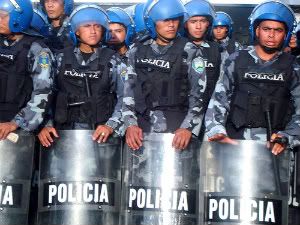
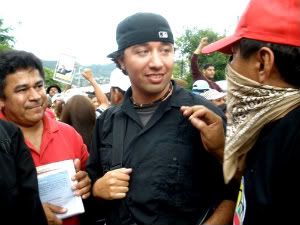
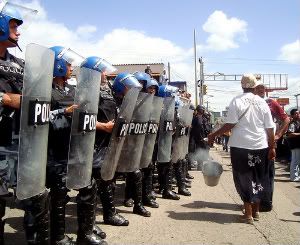
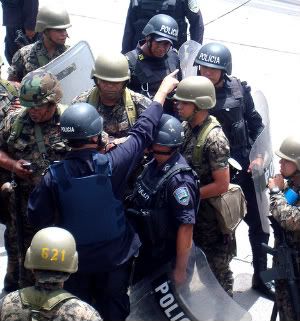
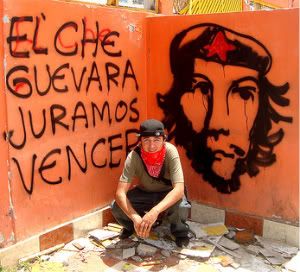
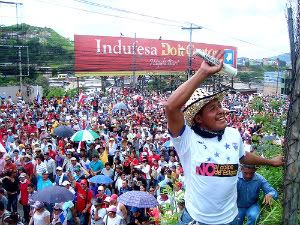
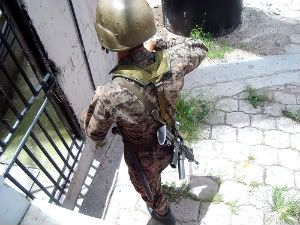
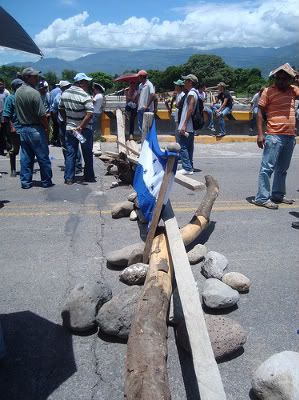
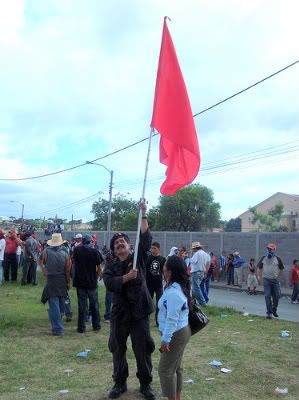
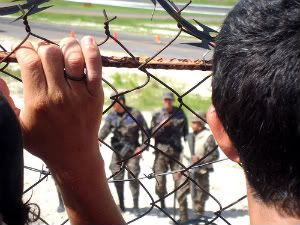
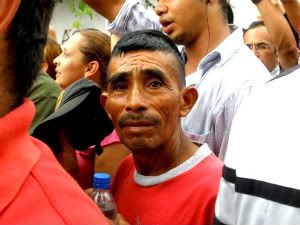
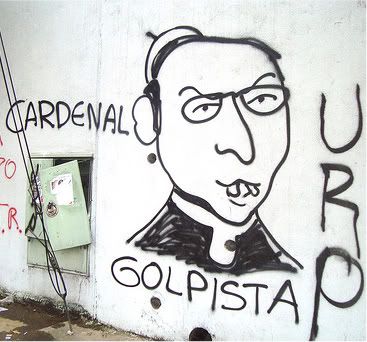
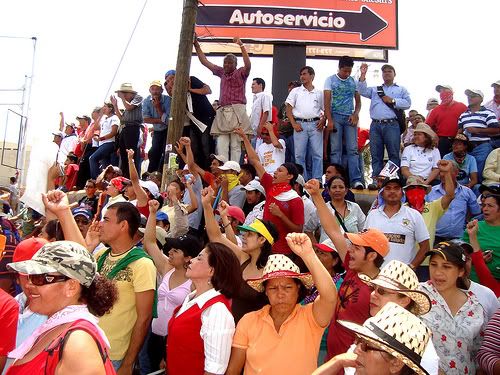
This comment has been removed by a blog administrator.
ReplyDelete